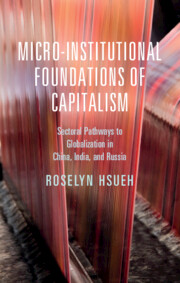Book contents
- Micro-institutional Foundations of Capitalism
- Micro-institutional Foundations of Capitalism
- Copyright page
- Dedication
- Contents
- Figures
- Tables
- Acknowledgments
- Part I Politics of Market Governance
- Part II Nations and Sectors: Patterns of Market Governance
- Part III National Configurations of Sectoral Models
- 12 Development, New Capitalisms, and Future of Global Conflict and Cooperation
- Bibliography
- Index
12 - Development, New Capitalisms, and Future of Global Conflict and Cooperation
from Part III - National Configurations of Sectoral Models
Published online by Cambridge University Press: 16 June 2022
- Micro-institutional Foundations of Capitalism
- Micro-institutional Foundations of Capitalism
- Copyright page
- Dedication
- Contents
- Figures
- Tables
- Acknowledgments
- Part I Politics of Market Governance
- Part II Nations and Sectors: Patterns of Market Governance
- Part III National Configurations of Sectoral Models
- 12 Development, New Capitalisms, and Future of Global Conflict and Cooperation
- Bibliography
- Index
Summary
This concluding chapter assesses the Strategic Value Framework for understanding the nonlinear and multidimensional nature of national sector-specific market pathways to development contrary to the expectations about the effects of open economy politics and regime type for particular modes of state-market interactions. The national configurations of sectoral models bridge different scholastic traditions in varieties of capitalism on the interactions between company-level and national-level characteristics and hierarchical state-business relations. Sector-specific dynamics emanating nation-specific sectoral pathways uncover how perceived strategic value and sectoral structures and organization institutions interact to affect how multinational and domestic companies alike experience the emergent institutional foundations of capitalism. This chapter further demonstrates how the new capitalisms play out in other strategic and non-strategic sectors in China, India, and Russia. The book concludes with analyzing the macro effects of the micro-institutional foundations on global conflict and cooperation—from trade wars and cross-border cybersecurity to the Covid-19 global pandemic. The analytical leverage of the Strategic Value Framework in identifying national sector-specific patterns of market governance sheds light on the politics of the management of the Covid-19 pandemic and how they varied across countries and industries within them.
Keywords
- Type
- Chapter
- Information
- Micro-institutional Foundations of Capitalism , pp. 331 - 360Publisher: Cambridge University PressPrint publication year: 2022

